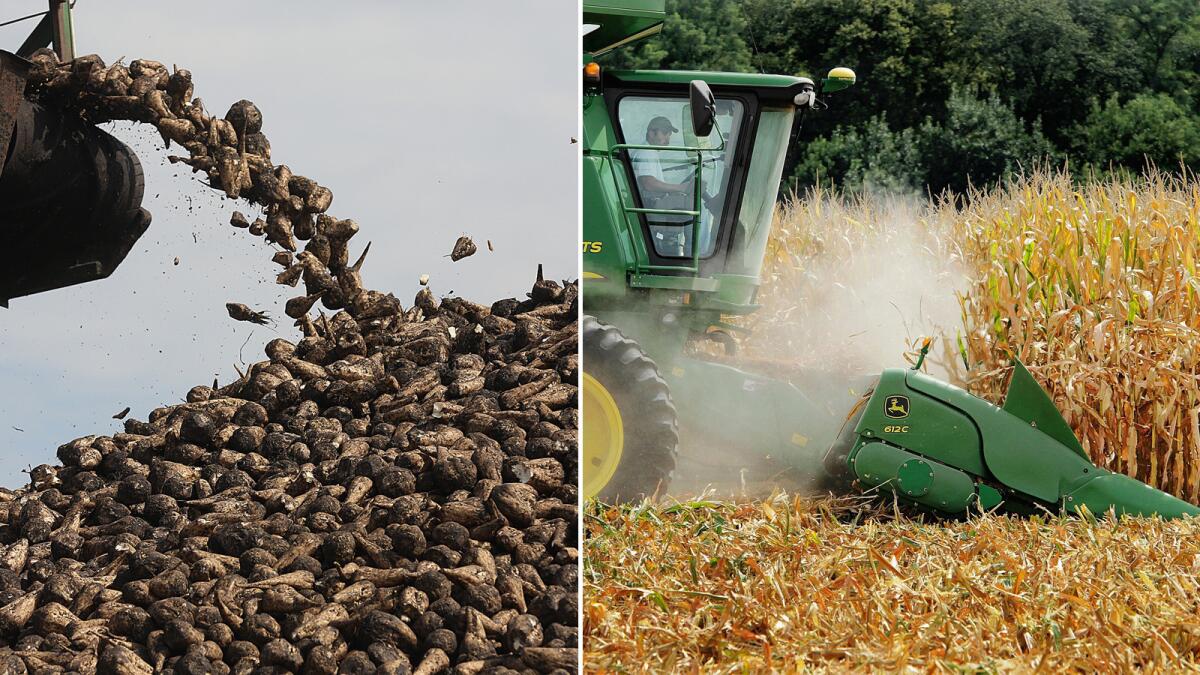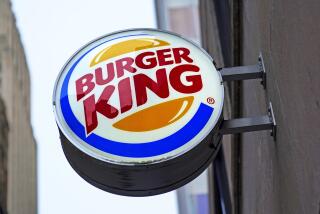The difference between sugar and high fructose corn syrup? Jurors will decide

Sugar beets, a source of table sugar, and corn, source of high-fructose corn syrup.
- Share via
It’s a bitter legal fight between the sweetest of enemies.
On Wednesday, the sugar industry took to a Los Angeles federal courtroom and accused high fructose corn syrup producers of falsely claiming that their product is just as healthful as sugar.
Corn syrup producers hit back, arguing that the sugar industry has long engaged in an unsavory campaign of misinformation.
The false advertising spat pits two sweeteners that have each been blamed for contributing to a host of ailments, including diabetes, obesity and tooth decay.
After years of delays and legal wrangling, the two titans of the food industry are engaged in a billion-dollar battle to determine whose claims of healthfulness — and unhealthfulness — are true.
NEWSLETTER: Get essential California headlines delivered daily >>
At the center of the trial is an advertising campaign that portrayed corn syrup as “nutritionally the same as table sugar” and claimed “your body can’t tell the difference.”
“That’s just wrong,” attorney Mark Lanier, who represents the sugar industry plaintiffs, told jurors during opening statements in the trial. “And the corn refiners know it.”
Attorney Dan Webb, who represents the corn refiners, countered that the effort was an “educational campaign” to combat a decade’s worth of falsehoods and junk science promulgated by sugar makers.
“It was to get the truth out there,” he told jurors.
The legal fight was sparked by an advertisement blitz on television and in newspapers and magazines beginning in 2008 proclaiming that the liquid sweetener is natural and no different from sugar.
The sugar industry wasn’t too sweet on the campaign.
In 2011, the Western Sugar Cooperative, along with other sugar processors, sued a group of corn refiners and farm belt giants Archer Daniels Midland Co. and Cargill Inc. The corn refiners filed a lawsuit of their own in response, arguing that the sugar industry falsely depicted corn syrup as less healthful than sugar in a desperate effort to combat flagging market share.
Big Sugar is seeking $1.5 billion in damages. Big Corn Syrup is seeking $530 million.
Attorneys spent much of Tuesday and Wednesday vetting prospective jurors for the nine who will decide the case.
One prospective juror, a recent college graduate, mentioned during questioning that he took nutrition and health courses in college that advised him to not have a “bad diet” that consisted of a lot of sugar. He was excused from the jury.
Another juror, a retired food salesman and distributor, was asked by U.S. District Judge Consuelo B. Marshall what type of food he sold to grocery stores.
“Candy,” he replied, to laughs from the audience and dozens of other jurors awaiting to be vetted. He was selected.
During opening statements, the competing attorneys described divergent narratives of how the squabble came to be.
Lanier began his opening statements by introducing some people seated in the audience, including sugar beet farmers, some wearing jeans, and executives of sugar companies, who wore suits. A drawing of a burlap sack filled with sugar opposite an industrial chemical vat labeled “HFCS,” for high fructose corn syrup, was projected on the wall and on televisions throughout the courtroom.
Lanier told jurors that in 2004, a report by the American Journal of Clinical Nutrition linked corn syrup to obesity, severely damaging the syrup’s foothold in the market. Corn executives needed something to stop the decline, he said.
“So they decided, ‘Let’s sell ourselves as sugar — let’s just say that we’re the same thing,” the attorney told jurors.
The campaign went beyond hard-nosed business tactics and crossed into outright lies, Lanier said.
“You can’t just make stuff up. You can’t go calling it corn sugar — it’s not. It’s high fructose corn syrup,” he said.
SIGN UP for the free California Inc. business newsletter >>
Webb told jurors that the sugar industry brought the “phony lawsuit” as part of a longtime desire for a competitive advantage. After high fructose corn syrup became commercially available in the 1970s, sugar began steadily losing its tight hold on the market.
“Sugar didn’t like that,” he said. “They didn’t want the competition.”
So about 10 years ago, the sugar industry began pushing unsubstantiated claims about corn syrup, including that it was the “crack cocaine of all sweeteners,” makes people “both fat and stupid” and that it is a “poison,” Webb said.
But both sugar and corn syrup are processed, despite what the sugar industry would like you to think, Webb told jurors.
The only difference is corn sugar is made from corn, he said.
“Sugar is sugar. There is no difference,” he said. “If you consume too much sugar, that’s not good for you. If you consume too much corn sugar, that’s not good for you.”
Twitter: @sjceasar
ALSO:
Case of pedestrian struck by car at 2014 Zombie Walk goes to jury
Search for new L.A. schools chief shifts focus to individual candidates
Family of Chinese mom who died after birth complications gets $5.2 million
More to Read
Sign up for Essential California
The most important California stories and recommendations in your inbox every morning.
You may occasionally receive promotional content from the Los Angeles Times.









